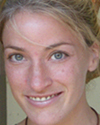
If you're a writer, a musician, or an artist, you can use Creative Commons licenses to share your digital works. But how can scientists license their work for sharing? In this conversation, Victoria Stodden -- a fellow with Science Commons -- explains to host Jon Udell why scientific output is different and how Science Commons aims to help scientists share it freely.
Victoria Stodden, a Science Commons fellow, is a Postdoctoral Associate in Law and a Kauffman Fellow in Law at the Information Society Project at Yale Law School. After completing her PhD in statistics, she obtained a Master's in Legal Studies in 2007 from Stanford Law School where she created a new licensing structure for computational research. Her paper proposing this Intellectual Property framework, called the Reproducible Research Standard, won the Kaltura Writing Competition, given in connection with the Third Conference on Access to Knowledge (A2K3) in 2008.
Victoria completed her PhD in statistics at Stanford University in 2006 with advisor David Donoho. her thesis evaluated regression techniques for cases where there are many more variables than observations, addressing a key consequence of the modern data deluge. A component of her dissertation was the creation and release of SparseLab, a collaborative platform for distributing code and data underlying published papers that focus on sparse solutions to underdetermined systems of equations. Her current research focuses on reproducibility of computational results, and includes understanding factors underlying code and data sharing among researchers, how pervasive and large-scale computation is changing our practice of the scientific method, and the role of legal framing for scientific openness and advancement.
Resources:
This free podcast is from our Jon Udell's Interviews with Innovators series.
For The Conversations Network: